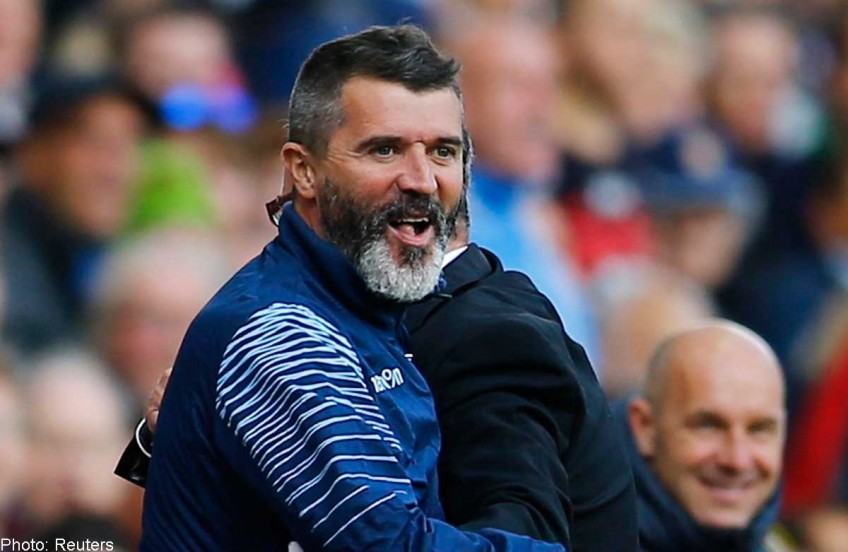Keane's mad, but he's mostly right


With the beard of a serial killer, Roy Keane is madder than a March hare in a Manchester United jersey.
But that doesn't make him wrong.
The Aston Villa assistant manager (left) is back with a second autobiography and quick to slaughter one sacred cow after another, taking down Sir Alex Ferguson, his former United team-mates and the Class of '92.
At the risk of siding with the modern game's equivalent of a mad axeman, here are some of Captain Crazy's more scathing attacks and why I mostly agree with him.
"The Class of '92 - all good players but their role at the club has been exaggerated … It has become a brand.
It's as if they were a team away from a team and they are not shy of plugging in to it … But we all had the same aims. We all had the same hunger."
1. On the Class of '92
Keane has long had a chip on his shoulder the size of the Stretford End when it comes to the Class of '92, particularly after his unceremonious exit from the club.
Nevertheless, the rise of the Class of '92 corporate brand is unmistakable, particularly since the terrific documentary and the purchase of Salford FC.
There is a risk, however, of airbrushing other key contributors out of United's history, namely the uncompromising skipper who galvanised and glued the side together.
Keane instilled a desire that ran through those United sides like a stick of Blackpool rock and it hasn't been replicated since.
"Somebody I met in Ireland had told me to tell him (Ferguson, far left): 'You are not going to win this.' I mentioned it to him. And I told him that I didn't think it was good for the club, the manager in a legal dispute with shareholders."
2. On Ferguson's dispute with United shareholders John Magnier and JP McManus over retired racehorse Rock Of Gibraltar
Whether it was Keane's place to question Ferguson's judgment in a non-football-related matter is a moot point.
Ferguson's legal case backfired spectacularly, for both the man and the club. His credibility suffered and the case tested the patience of Magnier and McManus, who published a humiliating dossier on Ferguson's running of the team.
In the end, the Irish businessmen sold their shares to the Glazer family, a deal that plunged United into a financial quagmire that they still haven't recovered from.
"Even now people still say: 'The video had to be destroyed.' Like it was a nuclear weapon or something … It was getting a bit silly so I got the players together in the dressing room and told them it was f------ nonsense. Not one of them had an issue."
3. On the infamous MUTV interview
Looking back, Keane's United exit represents a turning point in the modern game; a moment when precocious footballers and their obsequious agents became bulletproof.
Today, public comments from a club are patronizing and dull, insulting the intelligence of supporters.
A spade is no longer a spade, but an instrument of two halves, showing a lot of commitment and desire and thinking only about the next dig.
The game suffocates behind a smokescreen of spin. If tea cups are thrown or boots kicked in a dressing room now, agents are called, stories are leaked and a new home is sought.
From Danny Blanchflower and Bobby Charlton to Billy Bremner and Graeme Souness, the greatest sides were governed by uncompromising leaders; captains incapable of accepting an inferior work-rate.
Keane was no exception in that MUTV interview. How United could use him now in the age of fragile egos and self-interested superstars.
"(Former assistant manager Carlos Queiroz, left)) used the word "loyalty" to me. I said, 'Don't you f****** talk to me about loyalty, Carlos.
You left this club after 12 months a few years ago for the Real Madrid job. Don't you dare question my loyalty. I had opportunities to go to Juventus and Bayern Munich."
4. On that dirty word "loyalty"
Keane obsessed over loyalty, fixated on it. He exuded loyalty and demanded it back from those around him in equal measure.
His inability to compromise hurt his career for both club and country. He ran through walls and couldn't understand why others didn't behave in the same, obsessive way.
His dedicated long service to United began with a single phone call from Ferguson.
Today, club contracts for both players and managers aren't worth the paper they're written on. Keane was a loyal man out of touch with a greedy game.
"I had the evil thought: 'I'm glad he (Clive Clarke, right) had it tonight'; because it would deflect from our woeful performance."
5. And finally, an example of Keane being completely wrong
Keane is referring to former Sunderland defender Clive Clarke having a heart attack in 2007.
Clarke was on loan to Leicester at the time and suffered cardiac arrest on the same night the Black Cats lost to League One side Luton in the League Cup.
Keane was Sunderland manager then and more worried about the bad publicity than one of his players suffering a heart attack.
Thankfully, Clarke recovered. The same cannot be said for Keane.
He remains an incorrigible loudmouth committed only to success.
He's still a maddening man who refuses to be cowed by corporate pressure or intimidated by player power.
The game still misses him.

This article was first published on Oct 8, 2014.
Get The New Paper for more stories.